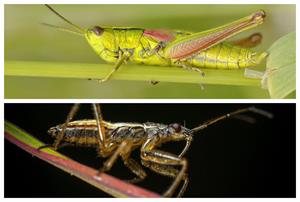PDF chapter test TRY NOW
"On the Grasshopper and Cricket" is a sonnet written by John Keats. The poem uses two insects, namely grasshopper and cricket, to explain how nature's music is eternal.
During the hot summer, even when the birds known for their songs are worn out and hide among the cooling trees, nature's music is kept alive through a grasshopper's song. As the grasshopper sings, he moves through the meadows, pouncing from a hedge to another. As a result, his songs get carried around, and "the poetry of earth" survives through the blistering summer. Later, when the grasshopper is tired after all the fun he had, he goes to get some rest beneath some pleasant grass.
Soon, as the winter comes, nature's music is faced with another existential crisis. However, the frozen silence is broken through the song of a cricket. The cricket, whose song and appearance resembles that of a grasshopper, keeps the "poetry of earth" alive and reminds people of the warm summer evenings, which ignites warmth and hope in them.
Hence, the true poetry of earth is life in itself, and the two otherwise insignificant insects keep that poetry alive.

A grasshopper (top); and a cricket (bottom)
